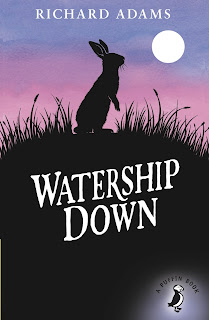According to its own author, Watership Down is simply an adventure story told to his own children about rabbits. I, for one, don't buy it. On one level, it absolutely is that adventure story - and one with heart and soul and spirit - but on another it serves as allegory for totalitarianism, for human spirit, and for those freedoms enjoyed in democracy.
It may surprise you that I hadn't read Watership Down until now; I suppose some would argue that I still haven't. It was my monthly listen on Audible, with Peter Capaldi providing the narration. For a fortnight, between work and home, I listened to the adventures of Hazel, Fiver, Silver, Captain Holly, and - my own favourite - Bigwig, actively hoping for short delays just to listen that little bit longer. For seventeen and a half hours I was engrossed in the tale of a hardy bunch of rabbits forging their new home on Watership Down. And every second was worth it.
A good book for children works for all readers. It works for both child and parent when they read together as a shared experience, and it's possible to admire the skill that goes into its creation. I'd certainly argue that listening to a story like Watership Down makes you feel a child again, but with adult sensibilities. Those things that drift over a child's head are absorbed by the adult, so the literary references, the historical placements, the epigraphs at the beginning of each chapter, and wider social context all find their mark alongside the qualities of the story.
And what a story. On the one hand, we have the rabbits who leave their warren to escape its destruction by men as part of a housing project, attempting to find their own home. They think they find it, only to discover that secrets are being kept by their new hosts, and they set out again to find Watership Down itself. As the new warren comes under threat, the greatest crisis faces the rabbits of the warren in the form of General Woundwort and the dictatorship of the warren of Efrafa.
A child will love the adventure and the characters; an adult will love the adventure and the characters, but on a different level. For this is no simple tale. Interwoven with the main plot is the lore of the rabbits, that of the spiritual El-ahrairah and his adventures, told through tales and legends. The world of the rabbits is so well-realised, the characters so well-drawn, that they are more human than many - perhaps most - characters and tales you'll find elsewhere.
This is Watership Down's greatest strength: the characters. You care for them, and they are real. Not real in the sense of being physically real, but in the sense that they matter. The fact that they are rabbits and not anthropomorphised rabbits actually helps; these aren't rabbits who make their own tools, they do real rabbit things - from eating their own tods to eating their own young. This isn't glossed over, which is to Richard Adams' credit; too many children's books sanitise reality rather than tackle it. One of the reasons Horrible Histories is so popular is because kids don't want to be talked down to about the world, and Watership Down certainly doesn't do that.
But the characters... I find it hard to put into words the quality of the characters. There are no characatures here. What we have are rabbits that have their dominant traits, it's true, but which are never beholden to them. They may normally show good judgement, but they can become prideful and learn from that. They may be able to inspire loyalty, but make mistakes. They may have a set way, but eventually come around to a different way of thinking. And it's this humanity to them that generates so much empathy and sympathy. This is true of every character in the book. Even minor characters firstly play their part, and secondly find themselves being so well fleshed-out that you can't help but support and hope for them. The main antagonist, General Woundwort, is no different; yes, he's mad, yes, he's very much a sociopath, yes, he's a mortal threat, and yet... and yet... He's still so human in his way. Parallels can be drawn between him and every dictator of the twentieth century, every strongman who used violence 'for the greater good', to use a term from another beloved book.
Better commentators than I have linked Efrafa to the dictatorships of the twentieth century - especially notably East Germany and the erection of the Berlin Wall 10 years prior to the publication of Watership Down - but it is worth mentioning. This in spite of the author's own insistence that this is just a book about rabbits. I normally listen to the author and I'm inclined to believe them as they know their own art, but I can't help but think Richard Adams was being coy for the sake of this being a children's book.
Should a very young child read this, or have it read to them? Probably not. But should a child of ten be allowed to experience it? Absolutely. This should be a gateway book to literature. As an adult I regret not reading it when I was younger, only to experience it anew as an adult so I could see both levels of Adams' mastery. As an adult, I absolutely loved what I experienced.





